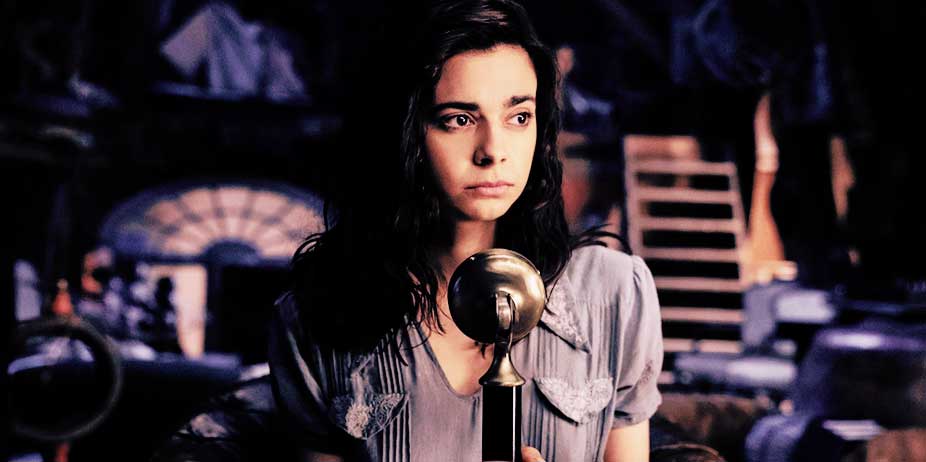
All the Light We Cannot See (2023)
I haven’t read the novel upon which this miniseries is based, but it’s a deeply compelling and intense melodrama with plenty of sorrow, depth, and incredible performances to go around.
As bombs fall upon a French coastal city, a lone female voice reads 20,000 Leagues Under the Sea on an illegal French radio. It belongs to Marie-Laurie (Aria Mia Loberti), a blind girl living alone in an old house, speaking to her absent father and asking her uncle Etienne to come home safe. A few miles away, a German radio operative named Werner (Louis Hofmann), is listening to her. He found her on the same wavelength as an old professor he used to listen to in an orphanage before the war, who inspired his mind, taught him to think, and helped him comprehend “all the light we cannot see.”
How did these characters come to be there and will they ever meet? That story is told in flashbacks. A few years earlier, Marie and her father Daniel (Mark Ruffalo) flee Paris after the German invasion. The curator and keeper of the keys of the Paris museum, Daniel pockets a legendary but cursed diamond to keep it out of the hands of the Germans. Alas, one particular German officer, Reinhold von Rumpel (Lars Eidinger) believes the diamond can give him eternal life, and pursues them across France. When he reaches Saint-Malo, he persistently interrogates and kills people, demanding they tell him where the “blind girl lives.” Little does Reinhold know that Marie has joined the French resistance, and now includes vital information for the Americans in her “innocent” reading of her favorite book. But time grows short for her, because any French broadcast is illegal… and once it’s discovered, Werner will have to lead his commanding officers to her home… or his sister will be killed.
Not having read the book and staying away from any descriptions of it on purpose to go into this series fresh, I found it incredibly exciting, moving, and suspenseful. It’s only four hours long and they pass much too quickly; I could have easily enjoyed another two hours with these characters. I’ll get my few complaints out of the way first. The ending is a bit unemotionally fulfilling and anticlimactic. It gives no sense of closure, and tells us nothing about what happened to the characters later, which is in keeping with a time of war, but felt a little out of place. (Having now read about the novel, it’s at least less depressing than that.) I did not hate it, it just felt like after four hours, I deserved a better one. And the “love” story is rushed, since these characters only just met. But everything leading up to the ending, particularly the last thirty minutes, is spectacular, as an intense climax unfolds against the violent backdrop of the bombing of the city.
Marie is a compelling heroine and the actress is magnificent; she’s unknown, a fresh face, and a compelling an confident force that gives Marie courage in the face of terrible odds. Hugh Laurie is also terrific as her “great uncle,” a shell-shocked WWI veteran who becomes a shut-in until the world “needs me again.” We flash backward in time and then come to the present, but it’s never hard to follow, as we learn bits and pieces of their story. It enriches the experience and makes losses all the more tragic, when we see the beautiful lives that lead up to them. And the symbol of love and independence Daniel gives his daughter, as he meticulously constructs a beautiful three-dimensional model of the city so Marie can find her way around, is heartwarming.
The costumes and setting are terrific, and we just take it as a matter of course that of course, not all Nazis were bad; some were conscripted, forced to serve, mistreated, and blackmailed into service. A few reviewers have complained that we aren’t forced to deal with the ethical implications of casting a Nazi soldier in the role of a romantic hero, but I don’t think it’s necessary. Werner is a good man, just as Marie is a good woman, and as Etienne tells him, in war “We’ve all done terrible things.” The f-word irritated me (especially since it wasn’t commonly used in this time period) but the story is so engrossing, I’m sure to revisit it many times in the future.
Sexual Content:
A man visits a French prostitute, but says he did not
come here for that; that his medicine has reduced his
libido. An officer uses a veiled rape thread to imply
what he's going to do to a young man's sister if he
doesn't obey orders (he will have the dogs tear her
apart, after their owners are done with her).
Language:
Fifteen or twenty f-words.
Violence:
People are shot at point blank. A man is tortured for
information (a man pounds his hand with a hammer, then
smashes his other hand; he says after four hours of
torture, the prisoner would not tell him what he wanted
to know). Main characters are forced to shoot people to
save themselves, and conceal the bodies; it's rarely
super bloody, but is jolting. The entire city is
engulfed in bombs and smoke when the Americans try to
claim it; people are blown through the air and sometimes
killed. A man is locked in a vault knowing his family is
going to be shot and he won't be there to stop it; a
young man tries to use a garrote to strangle a man but
does not quite succeed. Some of the violence is more
traumatic because it happens to characters we have grown
to love and care about. A man dunks a girl under the sea
many times to try and force her to give up information
(before she comes up for air and smashes his head with a
rock). It's implied an entire family is shot.
